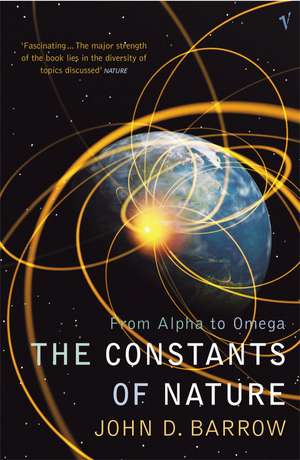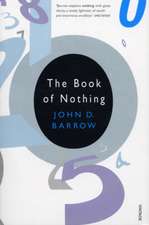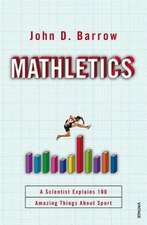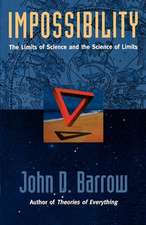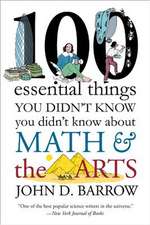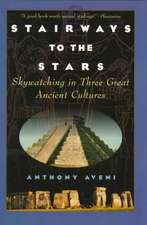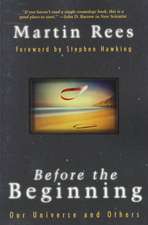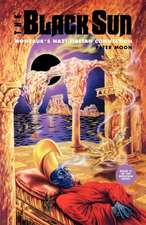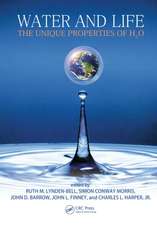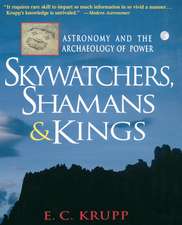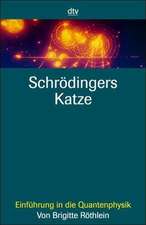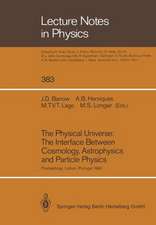The Constants Of Nature
Autor John D. Barrowen Limba Engleză Paperback – 7 aug 2003
| Toate formatele și edițiile | Preț | Express |
|---|---|---|
| Paperback (2) | 70.42 lei 22-33 zile | +27.03 lei 6-12 zile |
| Vintage Publishing – 7 aug 2003 | 70.42 lei 22-33 zile | +27.03 lei 6-12 zile |
| Vintage Publishing – 29 feb 2004 | 131.42 lei 3-5 săpt. |
Preț: 70.42 lei
Preț vechi: 83.24 lei
-15% Nou
Puncte Express: 106
Preț estimativ în valută:
13.48€ • 14.09$ • 11.39£
13.48€ • 14.09$ • 11.39£
Carte disponibilă
Livrare economică 14-25 februarie
Livrare express 29 ianuarie-04 februarie pentru 37.02 lei
Preluare comenzi: 021 569.72.76
Specificații
ISBN-13: 9780099286479
ISBN-10: 0099286475
Pagini: 368
Dimensiuni: 129 x 198 x 29 mm
Greutate: 0.35 kg
Editura: Vintage Publishing
Locul publicării:United Kingdom
ISBN-10: 0099286475
Pagini: 368
Dimensiuni: 129 x 198 x 29 mm
Greutate: 0.35 kg
Editura: Vintage Publishing
Locul publicării:United Kingdom
Notă biografică
John D. Barrow is Professor of Mathematical Sciences and Director of the Millennium Mathematics Project at Cambridge University, Fellow of Clare Hall, Cambridge, a Fellow of the Royal Society, and the current Gresham Professor of Geometry at Gresham College, London. His principal area of scientific research is cosmology, and he is the author of many highly acclaimed books about the nature and significance of modern developments in physics, astronomy, and mathematics, including The Origin of the Universe, The Universe that Discovered Itself; The Book of Nothing, The Infinite Book: a Short Guide to the Boundless, Timeless and Endless, The Artful Universe Expanded, New Theories of Everything, Cosmic Imagery and, most recently, The Book of Universes.
Extras
Chapter One
Before the Beginning
'What happens first is not necessarily the beginning.'
Henning Mankell
SAMELINESS
'There is nothing that God hath established in a constant cause of nature, and which therefore is done everyday, but would seem a miracle, and exercise our admiration, if it were done but once.'
John Donne
Change is a challenge. We live in the fastest moving period of human history. The world around us is driven by forces that make our lives increasingly sensitive to small changes and sudden responses. The elaboration of the Internet and the tentacles of the Worldwide Web have put us in instantaneous contact with computers and their owners all round the world. The threats from unchecked industrial progress have brought about ecological damage and environmental change that appears to be happening faster than even the gloomiest prophets of doom had predicted. Children seem to grow up faster. Political systems realign in new and unexpected ways more quickly and more often than ever before. Even human beings and the information they embody are facing editorial intervention by more ambitious spare-part surgery or the re-programming of parts of our genetic code. Most forms of progress are accelerating and more and more parts of our experience have become entwined in the surge to explore all that is possible.
In the world of scientific exploration the recognition of the impact of change is not so new. By the end of the nineteenth century it had been appreciated that once upon a time the Earth and our solar system had not existed; that the human species must have changed in appearance and average mental capability over huge spans of time; and that in some broad and general way the Universe should be winding down, becoming a less hospitable and ordered place. During the twentieth century we have fleshed out this skeletal picture of a changing Universe. The climate and topography of our planet is continually changing and so are the species that live upon it. Most dramatically of all, we have discovered that the entire universe of stars and galaxies is in a state of dynamic change, with great clusters of galaxies flying away from one another into a future that will be very different from the present. We have begun to appreciate that we are living on borrowed time. Cataclysmic astronomical events are common; worlds collide. Planet Earth has been hit in the past by comets and asteroids. One day its luck will run out, the shield provided so fortuitously by the vast planet Jupiter, guarding the outer reaches of our solar system, will not be able to save us. Eventually, even our Sun will die. Our Milky Way galaxy will be drawn into a vast black hole deep in its centre. Life like our own will end. Survivors will need to have changed their form, their homes and their nature to such an extent that we would be challenged to call their continued existence 'living' by our own standards today.
We have recognised the simple secrets of chaos and unpredictability which beset so many parts of the world around us. We under-stand our changing weather but we cannot predict it. We have appreciated the similarities between complexities like this and those that emerge from systems of human interaction - societies, economies, choices, ecosystems - and from within the human mind itself.
All these perplexing complexities rush along and seek to convince us that the world is like a runaway roller-coaster, rocking and rolling; that everything we once held to be true might one day be overthrown. Some even see such a prospect as a reason to be suspicious of science 3 as a corrosive effect upon the foundations of human nature and certainty, as though the construction of the physical Universe and the vast schema of its laws should have been set up with our psychological fragility in mind.
But there is a sense in which all this change and unpredictability is an illusion. It is not the whole story about the nature of the Universe. There is both a conservative and a progressive side to the deep structure of reality. Despite the incessant change and dynamic of the visible world, there are aspects of the fabric of the Universe which are mysterious in their unshakeable constancy. It is these mysterious unchanging things that make our Universe what it is and distinguish it from other worlds that we might imagine. There is a golden thread that weaves a continuity through Nature. It leads us to expect that certain things elsewhere in space will be the same as they are here on Earth; that they were and will be the same at other times as they are today; that for some things neither history nor geography matter. Indeed, perhaps without such a substratum of unchanging realities there could be no surface currents of change or any complexities of mind and matter at all.
These bedrock ingredients of our Universe are what this book is about. Their existence is one of the last mysteries of science that has challenged a succession of great physicists to come up with an explanation for why they are as they are. Our quest is to discover what they are but we have long known only what to call them. They are the constants of Nature. They lie at the root of sameliness in the Universe: why every electron seems to be the same as every other electron.
The constants of Nature encode the deepest secrets of the Universe. They express at once our greatest knowledge and our greatest ignorance about the cosmos. Their existence has taught us the profound truth that Nature abounds with unseen regularities. Yet, while we have become skilled at measuring the values of these constant quantities, our inability to explain or predict their values shows how much we have still to learn about the inner workings of the Universe. What is the ultimate status of the constants of Nature? Are they truly constant? Are they everywhere the same? Are they all linked? Could life have evolved and persisted if they were even slightly different? These are some of the issues that this book will grapple with. It will look back to the discoveries of the first constants of Nature and the impact they had on scientists and theologians looking for Mind, purpose and design in Nature. It will show what frontier science now believes constants of Nature to be and whether a future Theory of Everything, if it exists, will one day reveal the true secret of the constants of Nature. And most important of all, it will ask whether they are truly constant.
Before the Beginning
'What happens first is not necessarily the beginning.'
Henning Mankell
SAMELINESS
'There is nothing that God hath established in a constant cause of nature, and which therefore is done everyday, but would seem a miracle, and exercise our admiration, if it were done but once.'
John Donne
Change is a challenge. We live in the fastest moving period of human history. The world around us is driven by forces that make our lives increasingly sensitive to small changes and sudden responses. The elaboration of the Internet and the tentacles of the Worldwide Web have put us in instantaneous contact with computers and their owners all round the world. The threats from unchecked industrial progress have brought about ecological damage and environmental change that appears to be happening faster than even the gloomiest prophets of doom had predicted. Children seem to grow up faster. Political systems realign in new and unexpected ways more quickly and more often than ever before. Even human beings and the information they embody are facing editorial intervention by more ambitious spare-part surgery or the re-programming of parts of our genetic code. Most forms of progress are accelerating and more and more parts of our experience have become entwined in the surge to explore all that is possible.
In the world of scientific exploration the recognition of the impact of change is not so new. By the end of the nineteenth century it had been appreciated that once upon a time the Earth and our solar system had not existed; that the human species must have changed in appearance and average mental capability over huge spans of time; and that in some broad and general way the Universe should be winding down, becoming a less hospitable and ordered place. During the twentieth century we have fleshed out this skeletal picture of a changing Universe. The climate and topography of our planet is continually changing and so are the species that live upon it. Most dramatically of all, we have discovered that the entire universe of stars and galaxies is in a state of dynamic change, with great clusters of galaxies flying away from one another into a future that will be very different from the present. We have begun to appreciate that we are living on borrowed time. Cataclysmic astronomical events are common; worlds collide. Planet Earth has been hit in the past by comets and asteroids. One day its luck will run out, the shield provided so fortuitously by the vast planet Jupiter, guarding the outer reaches of our solar system, will not be able to save us. Eventually, even our Sun will die. Our Milky Way galaxy will be drawn into a vast black hole deep in its centre. Life like our own will end. Survivors will need to have changed their form, their homes and their nature to such an extent that we would be challenged to call their continued existence 'living' by our own standards today.
We have recognised the simple secrets of chaos and unpredictability which beset so many parts of the world around us. We under-stand our changing weather but we cannot predict it. We have appreciated the similarities between complexities like this and those that emerge from systems of human interaction - societies, economies, choices, ecosystems - and from within the human mind itself.
All these perplexing complexities rush along and seek to convince us that the world is like a runaway roller-coaster, rocking and rolling; that everything we once held to be true might one day be overthrown. Some even see such a prospect as a reason to be suspicious of science 3 as a corrosive effect upon the foundations of human nature and certainty, as though the construction of the physical Universe and the vast schema of its laws should have been set up with our psychological fragility in mind.
But there is a sense in which all this change and unpredictability is an illusion. It is not the whole story about the nature of the Universe. There is both a conservative and a progressive side to the deep structure of reality. Despite the incessant change and dynamic of the visible world, there are aspects of the fabric of the Universe which are mysterious in their unshakeable constancy. It is these mysterious unchanging things that make our Universe what it is and distinguish it from other worlds that we might imagine. There is a golden thread that weaves a continuity through Nature. It leads us to expect that certain things elsewhere in space will be the same as they are here on Earth; that they were and will be the same at other times as they are today; that for some things neither history nor geography matter. Indeed, perhaps without such a substratum of unchanging realities there could be no surface currents of change or any complexities of mind and matter at all.
These bedrock ingredients of our Universe are what this book is about. Their existence is one of the last mysteries of science that has challenged a succession of great physicists to come up with an explanation for why they are as they are. Our quest is to discover what they are but we have long known only what to call them. They are the constants of Nature. They lie at the root of sameliness in the Universe: why every electron seems to be the same as every other electron.
The constants of Nature encode the deepest secrets of the Universe. They express at once our greatest knowledge and our greatest ignorance about the cosmos. Their existence has taught us the profound truth that Nature abounds with unseen regularities. Yet, while we have become skilled at measuring the values of these constant quantities, our inability to explain or predict their values shows how much we have still to learn about the inner workings of the Universe. What is the ultimate status of the constants of Nature? Are they truly constant? Are they everywhere the same? Are they all linked? Could life have evolved and persisted if they were even slightly different? These are some of the issues that this book will grapple with. It will look back to the discoveries of the first constants of Nature and the impact they had on scientists and theologians looking for Mind, purpose and design in Nature. It will show what frontier science now believes constants of Nature to be and whether a future Theory of Everything, if it exists, will one day reveal the true secret of the constants of Nature. And most important of all, it will ask whether they are truly constant.
Recenzii
“Fascinating. The siren song of constants has drawn the greatest minds of physics and cosmology.” –The Washington Post Book World
“Barrow’s familiarity with the material allows him to glide from Pascal to Pasadena in smooth, informative paragraphs.” –Economist
“Barrow is a fantastic storyteller. The book is full of wonderful moments, vignettes that you will want to remember.” –The Guardian
“Barrow’s appeal lies in a winning way with historical anecdote and apt quotation and a forceful eloquence, when it comes to the most mind-boggling thoughts, that irresistibly sweeps you along.” –Daily Telegraph (London)
“Barrow’s familiarity with the material allows him to glide from Pascal to Pasadena in smooth, informative paragraphs.” –Economist
“Barrow is a fantastic storyteller. The book is full of wonderful moments, vignettes that you will want to remember.” –The Guardian
“Barrow’s appeal lies in a winning way with historical anecdote and apt quotation and a forceful eloquence, when it comes to the most mind-boggling thoughts, that irresistibly sweeps you along.” –Daily Telegraph (London)
